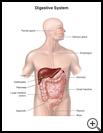
Upper GI Series (Barium X-ray Exam)
________________________________________________________________________
KEY POINTS
- An upper GI series is a procedure that uses barium and X-rays to look at your child’s throat, esophagus, stomach, and small intestine.
- Ask your child’s healthcare provider how and when you will get your child’s test results.
________________________________________________________________________
What is an upper GI series?
An upper GI series is a procedure that uses barium and X-rays to look at the upper digestive tract, which includes your child’s throat, esophagus, stomach, and small intestine. Your child’s esophagus is the tube that carries food from the throat to the stomach. Barium is a chalky white liquid that coats your child’s digestive tract and shows up well on the X-ray.
This procedure is also called an upper gastrointestinal (GI) barium study. If the test looks just at the esophagus and stomach, it is called a barium swallow.
When is it used?
An upper GI series of X-rays with barium may be done if:
- Your child may have an obstruction, which is a blockage anywhere in the upper digestive tract. A blockage may make it hard for food, gas, or fluids to pass through into the large intestine.
- Your child may have a perforation, which is a raw place or sore in the lining of the stomach or upper intestine that makes a hole. Stomach acids, bacteria, and food may move through the hole into your child’s belly and cause damage to nearby organs and blood vessels.
- Your child may have pain with swallowing or have a hard time swallowing.
How do I prepare my child for this procedure?
- Your child may or may not need to take regular medicines the day of the procedure. Tell the healthcare provider about all medicines and supplements your child takes. Some products may increase the risk of side effects. Ask the healthcare provider if your child needs to avoid taking any medicine or supplements before the procedure.
- Tell the healthcare provider if your child has any food, medicine, or other allergies such as latex.
- Your child’s provider will tell you when your child needs to stop eating and drinking before the procedure. This helps to keep your child from vomiting during the procedure.
- Tell your child’s healthcare provider if your older child is or may be pregnant or is breastfeeding.
- Follow any other instructions your child’s healthcare provider may give you.
- Ask any questions you have before the procedure. You should understand what your child’s provider is going to do. You have the right to make decisions about your child’s healthcare and to give permission for any tests or procedures.
What happens after the procedure?
Your child can go home after the test is done. Your child may have some nausea or bloating after the test. Your child may also be constipated from the barium. Unless your child’s provider tells you otherwise, your child should drink plenty of water and eat foods high in fiber until the barium passes. Ask if your child should take a laxative. Your child’s bowel movements may look white or gray for the next few days.
The test results will be reviewed by a radiologist and reported to your child’s healthcare provider. Ask your child’s healthcare provider how and when you will get your child’s test results. Do not assume the results are normal if you do not hear from your child’s health care provider or the place that did your child’s upper GI series. Radiologists are doctors who have special training in reading X-ray films and other types of images.
Follow your child’s healthcare provider's instructions. Ask the provider:
- If there are activities your child should avoid and when your child can return to normal activities
- How to take care of your child at home
- What symptoms or problems you should watch for and what to do if your child has them
Make sure you know when you should come back for a checkup. Keep all appointments for provider visits or tests.
What are the risks of this procedure?
Every procedure or treatment has risks. Some possible risks of this procedure include:
- The barium could cause a blockage in your child’s intestines, which can cause belly pain, nausea, and vomiting. A blockage can be life-threatening.
- Rarely, your child may have an allergic reaction to medicines used during the procedure.
- Rarely, barium can get into your child’s airway causing irritation.
Ask your child’s healthcare provider how the risks apply to your child. Be sure to discuss any other questions or concerns that you may have.
Last modified: 2021-12-07
Last reviewed: 2021-10-04

